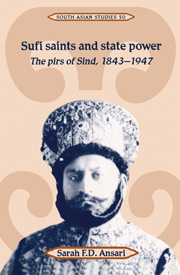Book contents
- Frontmatter
- Contents
- List of illustrations
- Acknowledgements
- A note on spelling
- List of abbreviations
- Glossary
- Introduction
- 1 Sind and its pirs up to 1843
- 2 Creating a system of political control after 1843
- 3 Challenge to the system: the Pir Pagaro and the Hur rebellion of the 1890s
- 4 Challenge to the system: the Khilafat movement, 1919–1924
- 5 A more complex system of political control: pirs and politics under the raj, 1900–1947
- 6 The final challenge: the Pir Pagaro again
- Epilogue
- Conclusion
- Select bibliography
- Index
- Cambridge South Asian Studies
Conclusion
Published online by Cambridge University Press: 01 October 2009
- Frontmatter
- Contents
- List of illustrations
- Acknowledgements
- A note on spelling
- List of abbreviations
- Glossary
- Introduction
- 1 Sind and its pirs up to 1843
- 2 Creating a system of political control after 1843
- 3 Challenge to the system: the Pir Pagaro and the Hur rebellion of the 1890s
- 4 Challenge to the system: the Khilafat movement, 1919–1924
- 5 A more complex system of political control: pirs and politics under the raj, 1900–1947
- 6 The final challenge: the Pir Pagaro again
- Epilogue
- Conclusion
- Select bibliography
- Index
- Cambridge South Asian Studies
Summary
The relationship between the British and the pirs of Sind grew directly out of the powerful position held by these Muslim religious leaders when the British conquered the region in 1843. It was affected, however, by the classic contradiction which lay at the basis of British colonial power everywhere. The British throughout their empire relied on local élites whose power was entrenched in the status quo at the time of colonial rule being imposed: but colonial rule, by its very nature, introduced changes which undermined the power of these élites, threatening their position in society. In Sind as elsewhere both parties effectively walked a ‘tight-rope’ in order to protect their interests and maintain the balance on which a successful alliance rested. When the balance was upset, however, the authorities usually resorted to force of some sort. The very nature of the institution of the pir could produce strains which weakened the British system of control. Pirs acted as levers between society and government, but they were subject to pressure from below just as much as from above. Their position depended on retaining the support of their followers and so they were never completely free to decide on the stand which they took towards the authorities. From time to time, therefore, pirs came into direct conflict with the British as a result of their need to fulfil the expectations of their followers.
The first Hur Rebellion of the 1890s represented an extreme example of the predicament in which an individual pir could find himself. On the one hand, the Pir Pagaro was pushed into taking a stand against the local authorities by a section of his murids.
- Type
- Chapter
- Information
- Sufi Saints and State PowerThe Pirs of Sind, 1843–1947, pp. 155 - 160Publisher: Cambridge University PressPrint publication year: 1992



